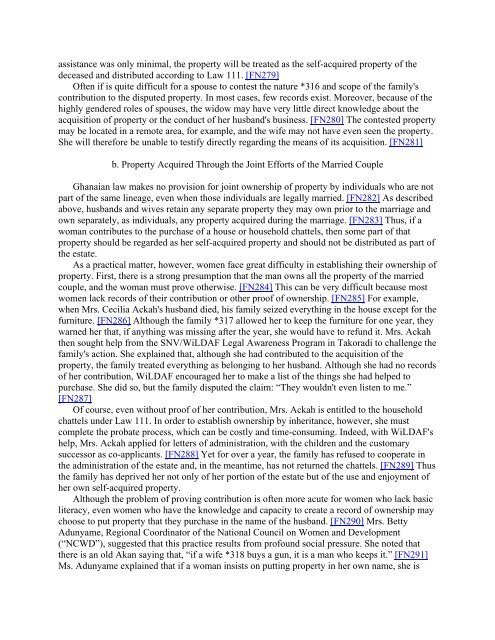Law, Culture and Women's Inheritance Rights in ... - Leitner Center
Law, Culture and Women's Inheritance Rights in ... - Leitner Center
Law, Culture and Women's Inheritance Rights in ... - Leitner Center
Create successful ePaper yourself
Turn your PDF publications into a flip-book with our unique Google optimized e-Paper software.
assistance was only m<strong>in</strong>imal, the property will be treated as the self-acquired property of the<br />
deceased <strong>and</strong> distributed accord<strong>in</strong>g to <strong>Law</strong> 111. [FN279]<br />
Often if is quite difficult for a spouse to contest the nature *316 <strong>and</strong> scope of the family's<br />
contribution to the disputed property. In most cases, few records exist. Moreover, because of the<br />
highly gendered roles of spouses, the widow may have very little direct knowledge about the<br />
acquisition of property or the conduct of her husb<strong>and</strong>'s bus<strong>in</strong>ess. [FN280] The contested property<br />
may be located <strong>in</strong> a remote area, for example, <strong>and</strong> the wife may not have even seen the property.<br />
She will therefore be unable to testify directly regard<strong>in</strong>g the means of its acquisition. [FN281]<br />
b. Property Acquired Through the Jo<strong>in</strong>t Efforts of the Married Couple<br />
Ghanaian law makes no provision for jo<strong>in</strong>t ownership of property by <strong>in</strong>dividuals who are not<br />
part of the same l<strong>in</strong>eage, even when those <strong>in</strong>dividuals are legally married. [FN282] As described<br />
above, husb<strong>and</strong>s <strong>and</strong> wives reta<strong>in</strong> any separate property they may own prior to the marriage <strong>and</strong><br />
own separately, as <strong>in</strong>dividuals, any property acquired dur<strong>in</strong>g the marriage. [FN283] Thus, if a<br />
woman contributes to the purchase of a house or household chattels, then some part of that<br />
property should be regarded as her self-acquired property <strong>and</strong> should not be distributed as part of<br />
the estate.<br />
As a practical matter, however, women face great difficulty <strong>in</strong> establish<strong>in</strong>g their ownership of<br />
property. First, there is a strong presumption that the man owns all the property of the married<br />
couple, <strong>and</strong> the woman must prove otherwise. [FN284] This can be very difficult because most<br />
women lack records of their contribution or other proof of ownership. [FN285] For example,<br />
when Mrs. Cecilia Ackah's husb<strong>and</strong> died, his family seized everyth<strong>in</strong>g <strong>in</strong> the house except for the<br />
furniture. [FN286] Although the family *317 allowed her to keep the furniture for one year, they<br />
warned her that, if anyth<strong>in</strong>g was miss<strong>in</strong>g after the year, she would have to refund it. Mrs. Ackah<br />
then sought help from the SNV/WiLDAF Legal Awareness Program <strong>in</strong> Takoradi to challenge the<br />
family's action. She expla<strong>in</strong>ed that, although she had contributed to the acquisition of the<br />
property, the family treated everyth<strong>in</strong>g as belong<strong>in</strong>g to her husb<strong>and</strong>. Although she had no records<br />
of her contribution, WiLDAF encouraged her to make a list of the th<strong>in</strong>gs she had helped to<br />
purchase. She did so, but the family disputed the claim: “They wouldn't even listen to me.”<br />
[FN287]<br />
Of course, even without proof of her contribution, Mrs. Ackah is entitled to the household<br />
chattels under <strong>Law</strong> 111. In order to establish ownership by <strong>in</strong>heritance, however, she must<br />
complete the probate process, which can be costly <strong>and</strong> time-consum<strong>in</strong>g. Indeed, with WiLDAF's<br />
help, Mrs. Ackah applied for letters of adm<strong>in</strong>istration, with the children <strong>and</strong> the customary<br />
successor as co-applicants. [FN288] Yet for over a year, the family has refused to cooperate <strong>in</strong><br />
the adm<strong>in</strong>istration of the estate <strong>and</strong>, <strong>in</strong> the meantime, has not returned the chattels. [FN289] Thus<br />
the family has deprived her not only of her portion of the estate but of the use <strong>and</strong> enjoyment of<br />
her own self-acquired property.<br />
Although the problem of prov<strong>in</strong>g contribution is often more acute for women who lack basic<br />
literacy, even women who have the knowledge <strong>and</strong> capacity to create a record of ownership may<br />
choose to put property that they purchase <strong>in</strong> the name of the husb<strong>and</strong>. [FN290] Mrs. Betty<br />
Adunyame, Regional Coord<strong>in</strong>ator of the National Council on Women <strong>and</strong> Development<br />
(“NCWD”), suggested that this practice results from profound social pressure. She noted that<br />
there is an old Akan say<strong>in</strong>g that, “if a wife *318 buys a gun, it is a man who keeps it.” [FN291]<br />
Ms. Adunyame expla<strong>in</strong>ed that if a woman <strong>in</strong>sists on putt<strong>in</strong>g property <strong>in</strong> her own name, she is


